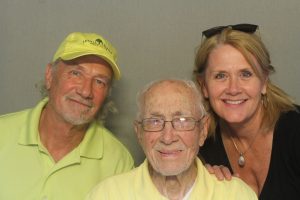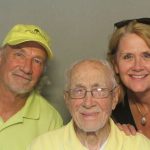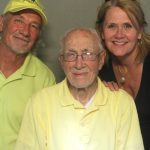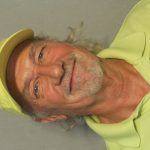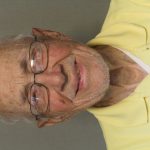Richard Best, Mary Ann Vergith, and Mark Best
Description
Richard Best (94) talks to his daughter Mary Ann Vergith (55) and son Mark Best (65) about growing up in Flint, MI during the Great Depression, joining the Air Force as a navigator during WWII, and going on to marry his wife and work at General Motors for 30 years.Subject Log / Time Code
Participants
- Richard Best
- Mary Ann Vergith
- Mark Best
Recording Locations
Flint Institute of ArtsVenue / Recording Kit
Tier
Initiatives
Keywords
People
Transcript
StoryCorps uses Google Cloud Speech-to-Text and Natural Language API to provide machine-generated transcripts. Transcripts have not been checked for accuracy and may contain errors. Learn more about our FAQs through our Help Center or do not hesitate to get in touch with us if you have any questions.
00:04 My name is Marianne for guess I am 55 years old. Today is Wednesday, August 21st, 2019 and we are in Flint, Michigan. I'm here today interviewing My Father Richard best and I'm here with my brother Mark best.
00:25 Hi, my name is Mark best and I am 65 years old. Today is Wednesday, August 21st, 2019 19 and we are in Flint Michigan and I'm here to interview My Father Richard best along with my sister Mary Ann best.
00:43 And do you know that?
00:48 My name is Richard best. I am 94 years old and I'm here on Wednesday after playing golf with my son who you just talk to.
01:01 And yes, this is Flint Michigan and my interviewing partners are Mark and Marianne and these are just two of my six children.
01:16 All right, Dad. So to start out tell us just I just want to learn a little bit more about when and where you were born and it's growing up here in Flint.
01:27 I was born in Flint, Michigan in 1925. I was
01:34 I don't know exactly what street I was born on but I lived on Hamill or not Hamilton but Greenway in the Haskell community area of Flint, which was a General Motors project at the time.
01:51 Did your parents work for General Motors father worked for General Motors? But my mother and father were both teachers at one time and it came here to Flint to live. There were basically one was from Brooklyn one was from Kalamazoo and we lived on Greenway my father worked at GM and my mother had retired at the time. I was born because my brother and I were ask children to be raised.
02:27 So what was it like growing up in Flint during the depression during the Depression? So how old are you in the Depression start?
02:37 How I old was I in the depression when the Depression started?
02:42 I would have been but for 5 years old when the Depression started. Yes and depression. My father lost his job. My mother was a teacher and she had to stop teaching so that she could have raised my brother and I so we were affected very basically by the depression.
03:09 There are issues with food or hunger or anything like that or
03:21 Did you?
03:23 What you get for Christmas when you were a kid? What are we do for Christmas? What you do for what? What's the most memorable Christmas present I ever got when you were a kid.
03:40 Well
03:42 I think I have the most memorable thing I can think of is a grown and a
03:48 World Book Encyclopedia, so that my brother and I could learn something about civilization in general and where it is and what it's doing both your parents were teachers right now.
04:05 Soldiering sold during the Depression Did you did you want for anything with it financially hard on your family on Greenway after that. We lived lost our house. I believe we lived in about six different locations before we found a place to live.
04:29 And there we stayed there temporarily and then finally that's settled on Chevrolet Avenue in the city of Park area of Flint.
04:40 And wizard was your father able to find any work during that time.
04:47 I just went to selling cars for Summerfield Chevrolet and I can remember riding with him when he delivered a car outside of the Flint area.
05:04 How big was Clint I mean you look at the borders of Flint now like Clio Road and like north of Dort Highway that that is all populated. Now with houses in subdivisions would have you when you were a kid? How big was Flint? Was it smaller than I'm sure well we rode most places by a bus. I had a busted in by right in front of the house. And when I was going to Central High School, I rode the bus from us a front part of my house to the front door of Central High School and was convenient but most of the people at that time or I guess you could say poor like we were
05:59 Cuz nobody was working tonight. Did you go to the Capitol Theater Capitol Theater building was there?
06:09 Did you go to place to go for matinees?
06:13 Saturday's will my mother used to get her hair done downtown and when she got her haircut, she dropped her my brother and myself off at the theater usually the Strand or the state which on Saturday had a double feature and other things to it took care of all the time. She was in the hairdresser.
06:38 Used to go when you said you said your mother was from Brooklyn, Brooklyn, Michigan, you're talking about your relatives in Brooklyn, Michigan. How long a drive is that right now? That would be maybe an hour and 15 minutes, maybe an hour and a half long it take to do that. But two hours we went down was she lived she was born on a farm outside of Ann Arbor and and when we drove down there where she lived there her up there and we would drive to Ann Arbor and over to my I guess it would be my uncle's Farm.
07:24 And they took us probably 2 hours at least maybe 2 hours and a half.
07:31 I remember trying to get ahold of what they called Bruce Hill or something like that in Ann Arbor and if it was slippery it took you about half a day to get up the hill was it where all the roads paved or do you have to go on back row seats that we lived in then you would go over on side road. I can remember there was a school house on the corner of the road that we turn down to get to my
08:05 Wife's family there in Brooklyn
08:16 So I remember a story about you playing marbles. How old are you?
08:27 This was a long full of high school and I was the marble champion of long for the high school. I got to the state finals. I lost to the guy that came in second. Thought I was third. Okay. So how did that go? I mean like for their people to State finals. So there's people coming from all over the place to play in the championship.
08:52 The tournament was within the school system of a flint but the guy that won it he he went to the finals. They are they drove around Chicago somewhere. I didn't go I didn't win. Okay that you were the local champion.
09:16 And I got like I said, I got to the third area of the finals and I I lost of the guy that won it did you get it? Did you win a prize? Did you get any reward? All right. I got some I got some pictures.
09:37 So what about what are like when you were a teenager, did you get into any trouble did you do anything that got you into trouble?
09:47 Like what's the like worst thing? You can remember you did that got you into trouble.
09:53 Or were you a good guy?
09:56 I didn't get into any trouble. I don't remember getting in any trouble. I like.
10:03 I just wondering if you were mischievious if you had any mischievious things that you did with you and your brother.
10:11 I can't remember anything. My brother was a couple years older than I was and he was a little probably did more adult things than I did at that age. But we never got into any trouble. We lived across the street from from Park Haskell Community House and the part that went with it and we spend most of our time they're playing their basketball and stuff like that.
10:47 What was it like knowing?
10:51 At 8:16
10:53 That as soon as you graduate you're going to war.
10:57 The dude's you're going to war soon as you graduate high school. You're going to war your future.
11:04 Well said for you are going to college no no, I I I knew what I was going to do. I had plans made earlier than that. I believe it was 1941 and I graduated from high school in 1943 and 1943 was the mid-year not March 1943. The first thing I did was go to Detroit and make out papers to enlist in the 8th the Air Force I was I like their planes at the time now.
11:41 What did you have second thoughts. Did you did you really think about it? Like they're going to put Me In Harm's Way, I could. Well, you don't think of those things that time you do because the moment you turn 18 years old you are drafted if you didn't know this before so you had the choice of being drafted and going into the regular army or Join one of the military things that you enjoy your thought. You would enjoy it was just to me was there a craft?
12:17 Well, that sounds like when I was 18 and fortunately the war with the Vietnam War was winding down at that time. But well, I mean there was talk of going people were going to Canada. They were bailing out there not something that ever will not be happened to your generation. Not then we had 71 Pearl Harbor get attacked or 4141 and the moment you turned 18. It was your obligation either to join or be drafted.
12:52 And that's why I wanted to go in the Air Force OSI winter Detroit and enlisted set that time then what happened was I was taking in and they told me to be ready to go to Chicago.
13:16 I believe it was in May and so I went to Chicago caught a train to try to train to Chicago. They met the service met me there and
13:33 From there
13:35 We got kind of separated into what we intended to do. We just took a physical if you passed the physical and were able to fly, then you went here. And from there you were at that time. We went to South Southern Michigan and that's where the Air Force Recruiting area was and I took test and I passed all the tests and they said you you qualify to be a pilot or anything else you want, but we don't need Pilots. We need Navigators and bombardiers cell and so
14:19 But I said well.
14:21 How about being a navigator? We went on to Houston, Texas?
14:28 And then from Houston, Texas to Paradise up to where we were going and I took a train from there and ended up on Christmas Eve in Coral Gables, Florida. Had the Pan-American navigation School.
14:46 Which PanAm was probably the only aircraft that flew over the water at that time. Anyhow, and that was the guy just for me to to go to the Pan-American school and I graduated from there and I believe it was April and from April. They told me to go home and they did call me and
15:15 What it is, and then they called me in to Chicago, but got me a uniform and then then sent me to North Texas to do just just regular army drill and you know basic training y'all to San Antonio and Houston and then from San from Houston, they sent me to Coral Gables.
15:47 So and so is a navigator. What was your job? What did The Navigators do?
15:55 They
15:58 You were the pilot was going. Okay, so you're
16:05 You had targets and you had to get there and you make sure you got there and got home. That's what I wanted to know. How did you navigate to use landmarks? Well, we had 20,000 ft 20 to 30,000. How did you know we had equipment I told you where you were and we had maps and that's a new for framing there. Just an intersection or railroad lines. Well your
16:57 I was stationed out of England and I flew across water most of the time in formation. So
17:07 I mean if you're coming in this is easier Bonnie runs, right as you're coming in on a bombing and I mean you have to somehow locate the target target. We had briefings before we flew we knew where we were going and how we were going to get there. What formations were flying in and it was pretty well settled ahead of
17:32 Hello time where you were going there was a lead Navigator and we followed him. Basically, I truly Navigator once or twice but most of the time I just flew with the crew that I was assigned to.
17:49 And how I'm sorry, I did go ahead we had formations we went we didn't go by ourselves and we went through formations of bombers is when we got to the Target we bomb just informed afterwards and came home. And how old were you when you were over in England and started flying on these missions 18 years old when I joined I was 19 years old and came up when I became a navigator and I was
18:23 Cir was my 20 years old when I got out that was about that was it and how many missions did you fly in 3536 because we we got turned back on one that we were halfway there.
18:48 Are there still lead playing had a problem and they turned back and the weather was bad. So we turn back with him and we were supposed to know buddy was supposed to turn by, okay.
19:02 So when you flew these missions like can you share with us? Like what are some things that happened like on some of these missions like anything out of the ordinary or like I know that you know, you told me one time your mission was to you know bomb.
19:21 Anything that Hitler used to make war what were some of the some of the targets and what were some of the things that happened while you are out on some of these missions
19:33 Well that that was the 8th Air Force assigned. It was Jimmy Doolittle.
19:41 And Jimmy Doolittle was his theory was bomb anything and everything that Hitler used to make war know. We bombed you and your mission Class B. Bob's railyards. We bombed basis anything that was assigned to us. We bomb we tried to destroy Hitler's ability to make war and we had some casualties and what we were lucky we got shot up, but we didn't get down or anything like that. Did you see any of your friends get shut down. Did you see any of your friends get shot down we lost
20:25 We lost a lot a lot of planes but the 8th Air Force washed considerably amount of people and plays as a home for that particular part of the war. That was after the storming of Normandy, right? That was the European Invasion Normandy. Well,
20:52 When I when I finish my navigation training I was sent to Lincoln Nebraska and there I met my crew from Millington, Nebraska who went to bang up into Idaho.
21:10 Girl and trained to fly bombers in Boise, Idaho and then one evening when we were having a we went to town to have a cocktail or two later.
21:27 And I stayed over in town, and I remember getting up in the morning and listening to the radio, and I'm telling us that the Normandy had happened. We had landed in Normandy. I had went right back to the bass and the bass pack your bags. You're leaving. We packed our bags. We had trained up there for a while probably a couple of months. Anyhow formation flying and you went to Jamaica Kansas and picked up an airplane and where to buy Max B-24 bomber and we flew to Bangor Maine from Bangor Maine up to
22:12 Nova Scotia, and then we went to Greenland and sage green land for a week because of bad weather then the Iceland and then we stayed overnight in Iceland and then on onto Northern Ireland left are playing in Northern Ireland and took a train and across to England primer the northeastern part of England.
22:50 Air on an air base there hasn't were there for the rest of the war. And how did you feel when you said you got the call like pack your bags? You're going. How did you feel do you remember?
23:05 Hello, are you heading didn't have a choice. You're you're on your way to England. That's what you are on your way to combat since the fighting. We were cited cited.
23:21 Frightened know now
23:26 I don't.
23:31 What was VE Day like?
23:33 War of 1945 and we had to mess around for about a month before we got our boat trip back to the cotton tonight USA. And then from there. I went home on leave and I was home on leave when the war ended.
23:57 And then I had to go or someplace else to check in and they were that's where I got discharged in California in the orient. Well as floor by missions, there was already another Air Forces in over in
24:20 Angel drawn Japan and China we were done with our Missions at that point. We I don't know what would have I guess I had a choice I could either stay in or I could leave with me.
24:40 When I was out to California, my original plan was to go to Pilot School because I had a my commanding officer had given me a recommendation to go to Pilot School and my girlfriend want me to come home.
24:59 So my girlfriend at the time was discharged and came home. Okay, and you ended up going to Michigan, Michigan 3800 students. I guess when I went that was it but that's
25:33 I could have gone to Pilot School if I wanted to in some days. I think I should have but I didn't Lansing. I mean it was just a sleepy little town right now is what undergraduate population of 50,000 or something like that.
25:54 I lived in a Barracks we have the wells Hall. I think this was the name of it was one of the only college dorms I lived in Wells hall for the first year. I was over there and then I joined a fraternity. Wish I regret now and literature.
26:19 Quest for money and yeah request for money, but I neglect them.
26:27 But you gave me credit for several hours college for going to Pan-American navigation school. Okay, cuz that was in that was at Miami University of Miami in Florida.
26:49 So what only took me into more years to get out I graduated I believe is 19 that would have been 1930.
26:58 7 or 1938 I think that's when I graduated. What was your first job out of college and how much did they pay you?
27:10 Dun & Bradstreet first job interviewing people at wanted unbred stretch to invest in them and I would go in and look at look. They're what their business over and
27:29 Racing
27:34 You're giving you a responsibility like that. I mean nowadays. Well bringing much bigger guns than that. Yeah, I suppose so, but I don't know why I had.
27:45 So I graduated from Michigan State. I believe it was.
27:52 I graduated from Michigan State in about 2 years. So they save me a lot of credit for going through navigation school. And then when I graduated I got that was my first job was done & Bradstreet. Then I went to work for General Motors. Could you buy a car? I bought a new one? No, I bought a used Chevrolet Coupe and it cost me. I don't even remember that but maybe it cost me $800 or something like that. They're very cheap back then and I use that when I was working.
28:37 Cuz I had to drive from car from business-to-business.
28:42 And then my eye.
28:48 I've had put my name in for General Motors because of the guy that was ran the employment department live at the Block at wait for me in.
28:57 Hawk Chevrolet Avenue mile over there and so I gave her my name and then I got a job working nights in the accounting department. And then from there I they sent me down to the Cleveland, Ohio and that's where you went to law school at night then writes what I was doing nothing. Nothing better to do whenever I didn't have any friends at that time. And so I just I had I had some time left on my GI Bill M near night Law School Baldwin Wallace, which now is a different one if Ernie, but that's was in so I went to law school and I graduated from there and two years later. So in Cleveland, that's where you met mom.
29:51 Sent out tell us about like when did you first see her? And what did you think?
29:57 I went to work for the warehouse in the area and Cleveland for Detroit or for GM and I was the lights.
30:11 I ran the the office part of it.
30:15 And we need her to keep on Chopper ater and we hired Shirley and when she walked in and sat down I said, she's the girl for me. I know I know from the time she she hired in and then when
30:35 Step the bad problem was it when we got married you couldn't have a wife and husband working in the same department. So if they get laid her off and I was the one that left working in in in Cleveland and we started our family in Cleveland and then I got transferred back to Flint and I've been there ever since. What was it like raising six children?
31:07 We enjoyed it. We we had we didn't have any problems. We weren't don't look at me don't have any problems of raising children that herb his buddy took off from school and went to California and stayed there for a couple of years. And that was when we read moved out to Flushing. So other than that show how many children did you really did and I think we all had a little stress over the years. I'm sure.
31:54 Parma I said, I'm sure we all had our moments of causing you a little stress. Like there was just the two of us to being with him was the only I have a picture of Pam when she was born off of Brookpark and Cleveland and that's was our first child. That was before we moved to Flint.
32:27 Newborn infants Park, I was born in Parma Heights, Ohio Flint to and then I will arrange my father worked in there a real estate in them. He arranged to have a house built over there on Seneca Seneca Avenue right off of Pasadena. So that's where we moved the Western close to the Clio Road is like exactly ball fields and then when
33:20 Hi work. I don't know why don't we?
33:25 I know we we we left there because of
33:32 Pam's babysitter came to the house, and she had a black eye.
33:40 And I said, how'd you get that and she said well when you're going to Northern High School, you don't make no trouble Rich go with the flow and I just made up my mind at that time that she wasn't going to go to Northern High School. So yeah, that was before that was when Amy was little right and then he made me now go to the house and I'll give you the lot for nothing.
34:20 So that worked out that we lived in Flushing relive went to school when school in Flushing. Are you familiar with flushing?
34:30 No, weld O2 School in Flushing the height of the elementary school in Flushing on Flushing Road, and they had to walk to school. I wanted to ask you a couple of things about about mom likes. What was your favorite thing about Mom? What is your best memory of your relationship with Mom?
35:03 She was she was just a wonderful woman. That's all I can tell you she was.
35:11 Sure. I knew her mother and father where you at, I used to go over and visit her and I would go on to play golf on the Eastside of Cleveland was there golf course in fact?
35:26 To this day. I think I was playing going for the same date. Arnold Palmer was playing down there and I wasn't playing with him, but I saw as a person and a tall fitted at you. He was there practicing this was before he turned professional. But anyway, I played golf over there and then I would go back and pick up your mother and then we can go back to where we watch was on the westside of Cleveland.
35:56 But that I like Cleveland play.
36:01 Then we bought a house over there then we sold it and when we had to move back to Flint cuz I got the job that I left the job I had and
36:14 Well
36:18 That's why I told you I went to law school.
36:24 I thought about it, but then I said well know you cuz they've offered me a job back in Flint that General Motors. And so we took that how long did you?
36:38 Circuit gym.
36:40 And how long have you been retired from GM? I guess if I retired in 1982 when I've been retires or anything, that's 18 36 37 years and you worked there about 30 year 37 year Levin retire. So you made out pretty well and I still get a pension from General Motors.
37:18 Okay, so Dad, what would be?
37:24 Is working marijuana wine down a little bit here, I guess. So, what would if you could give us are all of your children like one piece of wisdom or one piece of advice about life and growing old. What would that be?
37:42 What would I advise you wild life about about your experience in life? And what have you learned?
37:50 Well
37:53 I guess I've been I've been very lucky. I've never been other than recently. I have never been ill and we got along and hopefully with the children and live within your means, I guess that would be one of the best. I think you taught us really good values, but that's
38:21 See how much longer the last unfortunately we lost your mother. That's why she was.
38:34 She was the leader of the of the Groves, you know, you're growing up. I was working. She was home and taking care of you most about her.
38:49 I just I just loved her the most amazing. She was she and I got along well, and I think we did a fairly decent job raising a family. You did a great job.
39:07 Yeah, well Dad, so we're almost done. So I just want to thank you. Thank you for spending this time with us. And I want you to know how much I love you and admire you that you're sometimes we didn't agree on things. So what's up? It was enjoyable and fun still make
39:42 The family still gets together. The thing that I think is so wonderful about our family dad and it's credit to you. And Mom is that we all we all like each other anymore siblings and of course we love each other cuz we're siblings, but we all like each other and we enjoy the time that we spend together and that's credit to you and Mom. Well, she works sometimes when we lived over there in that.
40:12 The more we need to where we are now, but when we were little she was home all the time to be honest with you.
